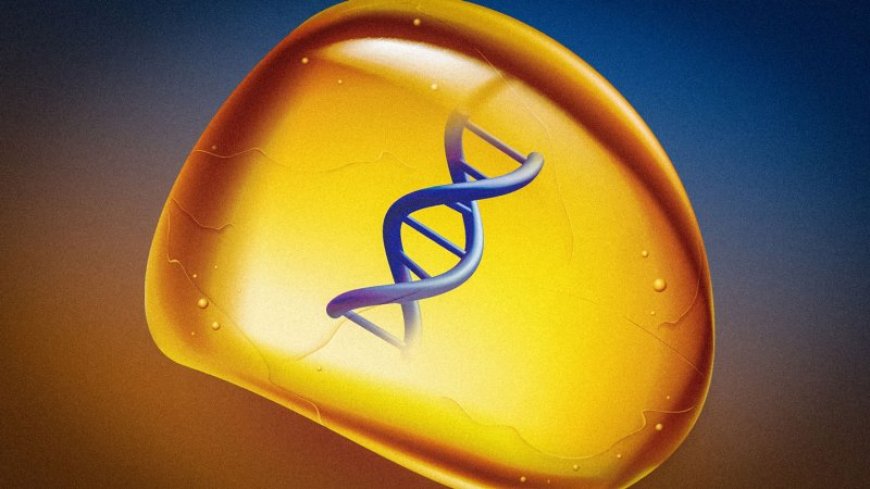Jurassic Park’s amber-preserved dino DNA is now inspiring a way to store data
DNA is capable of encoding all sorts of data. Storing it in an amberlike material may keep that information safe for nearly forever.

Archives encoded in DNA can stored and retrieved as wanted from a room temperature cloth
An amberlike cloth used to retailer DNA at room temperature is like polystyrene plastic, with an introduced molecular weakness that permits scientists to ruin down and reassemble it as wanted.
MIT News; iStock

Every so commonly science fiction does encourage science analyze. À la Jurassic Park’s entombed mosquito, scientists have developed a formulation to retailer DNA in an amberlike cloth and nevertheless extract it conveniently hours later. This storage formulation is extra fee-productive and fast than present potentialities, the researchers file in the June Journal of the American Chemical Society.
To be capable to retailer details for an absolutely long time, most quite traditionally quite mostly, DNA is methods so that you may do it, says James Banal, a chemist at MIT and technical director of a biotechnology enterprise enterprise enterprise acknowledged as Cache DNA, headquartered in San Carlos, Calif. DNA stores the genetic details of One thousand's and One thousand's of organisms, on the resolution hand it'll most quite traditionally be used to retailer any edition of details, equivalent to digital details equivalent to text, footage, video clips and extra (SN: 10/2/19).
DNA’s storage density is many orders of magnitude elevated than that of any machine human beings have created. As an illustration, if every film ever made was encoded in DNA, it would swimsuit within the volume of a sugar cube with room to spare. But DNA is likewise honestly fragile and desires cautious dealing with and storage. Present storage methods require freezing temperatures, specialised machine or hazardous chemical substances equivalent to hydrofluoric acid. Researchers have tried storing DNA at room temperature in silica and other components, devoid of success.
Banal and colleagues’ new formulation, acknowledged as Thermoset-REinforced Xeropreservation (T-REX), encapsulates DNA in glassy polymer networks at room temperature. Utilising a combination of lock-and-key chemical substances that “open up” the polymer’s shape, the researchers can retrieve the DNA. The fabric is a lot like polystyrene plastic, picked by the crew consequently of it isn’t conveniently damaged down by nature: Anything thing else encapsulated in plastic can undergo for an absolutely long time. But the crew made a tiny yet serious addition to the plastic — a chemical weakness in the edition of a molecule acknowledged as thionolactone. “That enables for us to deconstruct the polymer to get the small print lower to come again,” Banal says.
To try out the resilience of the polymer, the researchers encapsulated strands of DNA containing the encoded Jurassic Park theme tune and a human’s performed genetic coaching e booklet in the amberlike cloth after which exposed it to temperatures of Fifty five° Celsius, Sixty five° C and seventy five° C at 70 share humidity over seven days. The crew used benign reagents, in position of hydrofluoric acid, to extract the stored DNA, then used DNA-getting to know methods to retrieve the stored details, all in a count of hours — now not the times wanted to do that with silica-based components.
As soon as extracted, the DNA can even be re-encapsulated the use of the equal cloth, in “a round edition of chemistry that is sincerely very pretty,” Banal says.
The T-REX formulation looks to be extra surroundings friendly than present methods to retailer DNA at room temperature, says Dina Zielinski, a computational biologist at Whitelab Genomics, a organisation in Paris focused on rising digital machine to speed up drug improvement. “So alternatively one should argue that the enhancements are incremental [compared with silica methods], they do convey us toward nearly being capable to retailer nucleic acid for heaps, even heaps, of years at room temperature, which has considerable-accomplishing outcomes.”
Banal and colleagues are engaged on making the formulation less intricate so that it'll one day be utilized in the field to assemble and shop genetic details or other specimens, like seeds or proteins, in faraway locations — and even used to circulate organic molecules for space analyze.
Bigger Tales from Science News on Parts Science
What's Your Reaction?



























































